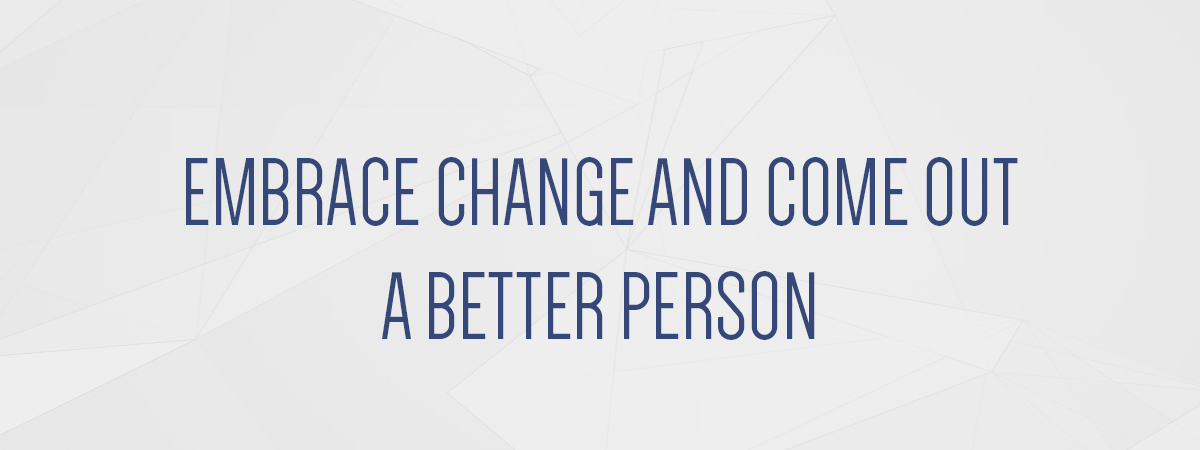
 Change can be exciting, fun and refreshing, but let’s be honest, sometimes change can be the exact opposite and we end up feeling completely overwhelmed, upset and tired. While we all know that change is the only constant in our life and unavoidable, sometimes change is within our control, but more often than not, it is not.
Change can be exciting, fun and refreshing, but let’s be honest, sometimes change can be the exact opposite and we end up feeling completely overwhelmed, upset and tired. While we all know that change is the only constant in our life and unavoidable, sometimes change is within our control, but more often than not, it is not.
In a split second life can change. A freak accident, a career change, breakups, the loss of a loved one, financial downturns… stuff happens and all of these transitions from one thing to the next can trigger stress. And nobody likes stress.
New neuroscientific research proves that as human beings we are creatures of habit and change can trigger powerful effects on our brain circuitry and with that our emotions, feelings and body. This means, it is perfectly normal to feel a little unsettled with change, however, fighting change is not the answer.
Fortunately, there are ways to adapt to change in a positive way or even take advantage of it. Here are our TOP 10 tips to learn how to deal with change.

#1 Take Care of Yourself
In order to be able to effectively deal with change, you have to take care of yourself. In the moment of change – like when you move to a new apartment, start a new job, have a baby or deal with the death of a loved one – it is crucial to take extra good care of yourself on a physical as well as mental level. Without your physical and mental health, it can be extremely difficult to process change and the challenges that come with it in a healthy way. Make sleep, healthy eating, exercise and emotional well-being a non-negotiable and figure out what you need to do to feel great and then go out and do it.
#2 Change Your Perspective
Sometimes change can be bad, like a break up or getting fired from your job. But when bad things happen, you have a choice. You can either choose to sulk in it and see it like the end of the world, or you can use this change as an opportunity to find something that can lead you to even better things. It is all about your perspective and when you learn how to reframe your perspective into something empowering, you will get through even the toughest of changes. Look at the bright side and figure out what good can out of what appears to be a giant mess.
#3 Remember, You’ll Adapt to Change
No matter what change you are dealing with, it is hugely important to remember that you will over time get used to it. While it may seem impossible in the moment, especially when you are dealing with bad news or change that wasn’t initiated by you, keep in mind that over time, even those things will lose their edge. It is amazing how we as human beings have the ability to adapt to anything. And if you trust that you will be able to adapt, then you will.
#4 Don’t Make Too Many Changes at Once
When you initiate change yourself, keep in mind that piling on too many changes all at one will only stress you out. For example you decide to move to a different city and start a new job, it may seem like a good idea to adopt a dog, find new friends and take on a couple of new hobbies at the same time. But while all these ideas are great, too much at once can be overwhelming. Instead of trying to change everything at once, take it slow and let yourself get settled in the new city and job before you adopt a dog and get comfortable with one new hobby, before you pick up another one. You get the idea… slowing things down will help you to adjust easier.

#5 Embrace Your Emotions
Dealing with change, it is natural to get emotional and feel sad over the loss of something or angry about a situation or even try to place blame. Give yourself permission to feel your emotions, but only for a certain amount of time. Have your pity party, but only for a day or two and then move on. When you spend too much time in a place of pity, anger or blame, you won’t be able to adapt to the change and it only keeps you stuck helpless and in victim mode. What you need to do is to get into a state of growth and hope and with that adapt more quickly to whatever change comes your way.
#6 Give Yourself Permission to Be Vulnerable
Most of us like to be the picture of strength and fearlessness, but sometimes, we just don’t feel like it. The reality is that sometimes we are scared, weak and vulnerable and in need of help. It’s ok to show our vulnerability and it’s ok to allow ourselves to get help from others. Sure, you may feel exposed, but that’s not always a bad thing. There is tremendous power in vulnerability and it allows us to learn and grow and if you allow people to see your vulnerable side, you can strengthen your relationships and at the same time have the support to deal with stress and pain.
#7 Ask for Help
A lot of times, when we have to deal with difficult change, the people around us don’t know how to deal with us. They don’t know what to say when you lose a loved one or they don’t know how to deal with you when you had an accident. The minority of people are natural caregivers and jump right in to help you. Others, you have to specifically ask for help and let them know what you need. Learn how to articulate what you need and the people around you will feel a sense of relief and will be happy to know how to help and support you. Empower yourself and the people around you by learning how to ask for help.
#8 Find the Humor in the Situation
When dealing with difficult change, try to find a funny moment in an otherwise dramatic change. This can be a fantastic way to see the problem in a new perspective and be able to adapt to the change more quickly. Lighten your mood, laugh out loud and improve your social interactions. Just make sure that you do it in a respectful way and keep in mind that other people’s challenges are no laughing matter, but your own struggles can be a source of comedic gold.
#9 Keep Your Routine
The more change that is happening in your life, the more important it is to keep a routine as much as possible. Even if you lose your job, make it a point to walk your dog at 8am every morning or go to the gym as soon as you wake up. Sticking to a schedule can be an anchor that reminds us that some things are still the same and it gives our brain a little break. Do as many things as possible according to your regular routine and you will be able to adjust to the change much better and more quickly.
#10 Get Proactive
Being proactive means that you are in charge and you work preventatively. Sure not every change can be anticipated, but if you initiate change, figure out what steps you need to take before the change happens. Keep in mind, being reactive means that you wait for something to happen to you and then take action. But being proactive means that you anticipate what’s to come ahead of time and take action before it even happens so you can deal with the change in a less stressful manner.
Nothing lasts forever and change is a great thing. Just think about it, change inspires innovation, creativity and an incentive for improvement, all of which means that we are moving forward and ultimately improve our lives. Reality is, life is going to throw you some curveballs from time to time, whether you like it or not. When we can learn to manage change in a positive way, we set ourselves up to use the new circumstances to our advantage and create the life of our dreams.
EMBRACE CHANGE AND COME OUT A BETTER PERSON
Joschi & Monika
#BoldNaked
